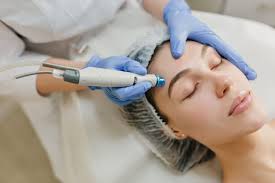Ph.D. in Cosmetology: Introduction, Admission, Registration, Eligibility, Duration, Fees, Syllabus 2024

Introduction:
Embarking on a Ph.D. journey in Cosmetology immerses individuals in the science and art of beauty, exploring the intricacies of skincare, haircare, makeup, and cosmetic formulations. This guide illuminates the admission process, eligibility criteria, completion time, career prospects, syllabus overview, internship opportunities, scholarships, and FAQs relevant to aspiring scholars in this field.
Admission Process:
- Research: Identify universities offering Ph.D. programs in Cosmetology and explore faculty expertise and research areas.
- Application Submission: Complete online applications, including transcripts, recommendation letters, statement of purpose, and GRE scores (if required).
- Entrance Exam: Some institutions may require standardized tests like GRE or subject-specific exams.
- Interview: Shortlisted candidates may undergo interviews to assess research potential and fit with the program.
Eligibility:
- Educational Background: A master's degree in Cosmetology, Chemistry, Biology, or related fields from a recognized institution.
- Academic Performance: Strong academic record, typically with a minimum GPA requirement.
- Research Experience: Prior research experience or publications in cosmetology-related topics demonstrating research aptitude.
- Writing Skills: Proficiency in scientific writing and analysis, often evidenced through writing samples and statement of purpose.
Completion Time:
The duration of a Ph.D. program in Cosmetology generally spans 3 to 5 years, involving coursework, research, and dissertation writing. However, completion times may vary based on research progress and program requirements.
Career Opportunities:
- Research and Development: Roles in cosmetic companies, conducting research on new ingredients, formulations, and product innovations.
- Product Testing: Opportunities in laboratories or regulatory agencies, evaluating the safety and efficacy of cosmetic products.
- Education and Training: Positions in academia or vocational schools, teaching cosmetology courses and training future professionals.
- Consulting: Careers as cosmetic consultants, providing expertise to businesses on product development, marketing, and regulatory compliance.
- Entrepreneurship: Opportunities to launch cosmetic brands or consulting firms, leveraging expertise in formulation and market trends.
Syllabus:
- Cosmetic Chemistry: Study of chemical composition, structure, and function of cosmetic ingredients, including emulsions, surfactants, and preservatives.
- Dermatological Principles: Exploration of skin physiology, conditions, and treatments relevant to cosmetology, including anti-aging strategies and skincare formulations.
- Hair Science: Understanding hair structure, growth cycles, and treatments, including haircare product development and styling techniques.
- Cosmetic Formulation: Hands-on experience in formulating cosmetics, including creams, lotions, makeup, and haircare products, considering stability and efficacy.
- Regulatory Affairs: Overview of cosmetic regulations, safety assessments, labeling requirements, and international standards governing cosmetic products.
Internship Opportunities:
- Cosmetic Companies: Internships with leading cosmetic brands, gaining practical experience in product development, testing, and marketing.
- Research Institutions: Internships in research labs or universities, contributing to cosmetology research projects and gaining exposure to cutting-edge technologies.
- Regulatory Agencies: Internships with government agencies responsible for cosmetic regulation, assisting in safety assessments and compliance monitoring.
- Beauty Salons and Spas: Internships in salons or spas, learning practical skills in cosmetology practice, client consultations, and treatment procedures.
Scholarships and Grants:
- Institutional Scholarships: Universities often offer merit-based scholarships to Ph.D. students in Cosmetology, covering tuition fees and providing stipends for living expenses.
- Industry Grants: Funding opportunities from cosmetic companies or industry associations to support research projects or conference attendance.
- Professional Associations: Scholarships and grants offered by cosmetology associations or foundations to support education and research in the field.
- Research Fellowships: Prestigious fellowships like the National Institutes of Health (NIH) or National Science Foundation (NSF) offer funding and recognition for cosmetology research.
FAQs:
Can I pursue a Ph.D. in Cosmetology with a background in a non-related field?
While a background in Cosmetology, Chemistry, or Biology is preferred, some programs may consider applicants with relevant experience or coursework in related fields.
What types of research projects can I pursue in a Ph.D. program in Cosmetology?
Research projects in cosmetology may focus on areas such as skincare formulations, haircare treatments, cosmetic safety assessments, or consumer behavior studies.
Are there opportunities for international students in Ph.D. programs in Cosmetology?
Yes, many universities welcoe international students to their Ph.D. programs in Cosmetology, offering support services and funding opportunities.
How can I prepare for a Ph.D. in Cosmetology?
Prioritize gaining research experience, strengthening scientific writing skills, and familiarizing yourself with cosmetology concepts and industry trends through coursework or internships.
What are the career prospects like for Ph.D. graduates in Cosmetology?
Ph.D. graduates in Cosmetology have diverse career opportunities in cosmetic research and development, product testing, education, consulting, and entrepreneurship, both in industry and academia.
